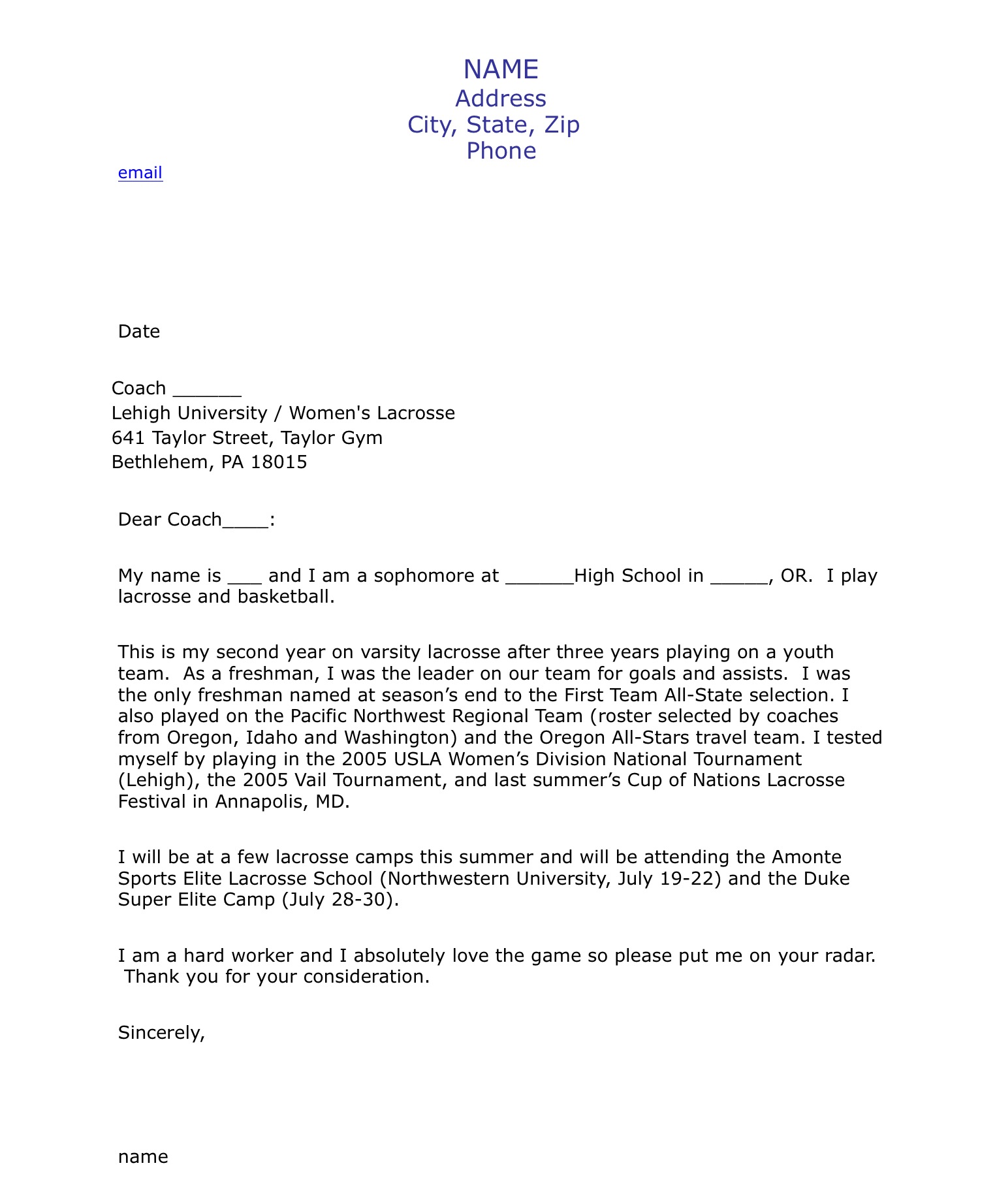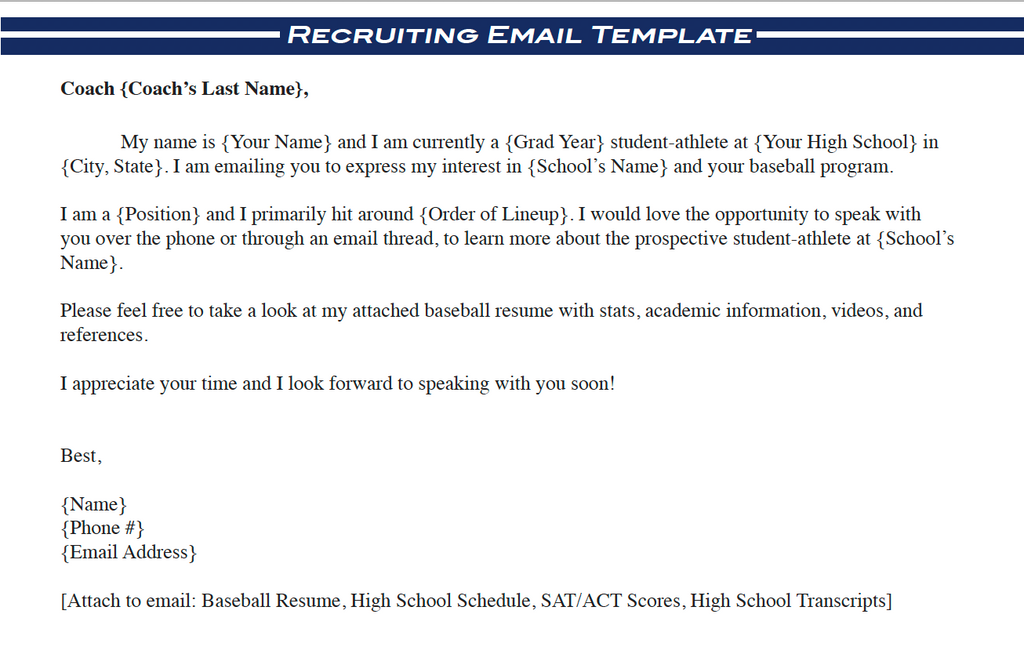Reaching out to college coaches can be a pivotal moment in an athlete’s career. An effective email can open doors to scholarships, recruitment opportunities, and lifelong connections. In this comprehensive guide, we will explore how to craft emails that resonate, provide actionable examples, and highlight the best practices for communicating with college coaches.
Understanding the Importance of Email Communication
Email communication is a vital part of the recruitment process. A well-crafted email serves multiple purposes:
- Introduces the athlete to the coach.
- Highlights the athlete’s skills and achievements.
- Demonstrates the athlete’s interest in the program.
- Establishes a personal connection.
Why Coaches Prefer Emails
Coaches receive numerous inquiries daily, making email a preferred form of communication. Emails allow coaches to:
- Quickly assess an athlete’s interest and skills.
- Keep records of correspondence.
- Respond at their convenience.
Preparing to Email College Coaches
Before hitting the send button, consider the following steps to enhance your email’s impact:
Researching the Program
Take time to research the college and its athletic program. This can include:
- Understanding the team’s culture.
- Identifying the coach’s background and coaching philosophy.
- Familiarizing yourself with the team members and their achievements.
Creating a Target List
Develop a list of coaches you want to contact. Be specific and focus on programs that match your skill level and academic interests.

Structure of an Effective Email
Here is a suggested structure for your email to ensure it remains professional and engaging:
1. Subject Line
Your subject line should be clear and concise. For example:
- “Prospective Athlete: [Your Name] – [Sport] – Class of [Year]”
2. Greeting
Use a respectful greeting. For instance:
Dear Coach [Last Name],

3. Introduction
Your introduction should include your name, sport, and brief background. Example:
My name is [Your Name], a [Your Class, e.g., junior] at [Your High School]. I'm a [Your Position] who is passionate about [Sport].
4. Body of the Email
Here, provide details about your achievements, statistics, and why you’re interested in their program. Highlight any relevant stats or accolades:
Over the past season, I have [mention your performance, e.g., scored X goals, achieved X average]. I am particularly impressed with your program's emphasis on [mention something specific about the program, e.g., teamwork, player development].

5. Closing
Conclude your email with a call to action, such as a request to schedule a phone call or visit the campus:
I would love the opportunity to discuss how I can contribute to your team. Thank you for your time and consideration.
6. Signature
End with a professional signature, including your contact information:
Best regards,
[Your Name]
[Your Phone Number]
[Your Email]
[Your Social Media or Personal Website, if applicable]
Sample Emails to College Coaches
Example 1: Soccer Player
Subject: Prospective Athlete: Alex Johnson – Soccer – Class of 2025
Dear Coach Smith,
My name is Alex Johnson, a sophomore at Lincoln High School. I am a forward on our varsity soccer team with a passion for the game. Over the past season, I scored 22 goals and provided 15 assists, leading my team to the state quarterfinals. I’m particularly impressed by your program’s success in developing players’ skills and your commitment to fostering teamwork.
I would love to learn more about your program and discuss how I can contribute to the team at [College Name]. Thank you for your time!
Best regards,
Alex Johnson
(555) 123-4567
[email protected]
Example 2: Basketball Player
Subject: Prospective Athlete: Maria Lopez – Basketball – Class of 2024
Dear Coach Miller,
My name is Maria Lopez, and I am a junior at Springfield High School. I am a point guard and recently averaged 18 points, 5 assists, and 4 rebounds per game. Your team’s recent achievements in national championships caught my attention, and I would be thrilled to be part of such a successful program.
Can we schedule a time to discuss how I can fit into your team dynamics? Thank you for considering my application!
Best regards,
Maria Lopez
(555) 987-6543
[email protected]

Tips for Crafting Successful Emails
Personalization is Key
Aim to personalize each email. Mention specific details about the program to show genuine interest.
Be Professional
Maintain a professional tone throughout the email. Avoid slang and ensure proper grammar and spelling.

Follow Up
If you don’t hear back within a week or two, consider sending a polite follow-up email. This demonstrates your continued interest in the program.
Timing Matters
Consider the timing of your emails. Sending emails during off-peak times, such as early mornings or late afternoons, may increase the likelihood of your email being read.

Using Technology for Follow-Up
Utilize CRM platforms like Hudl or BeRecruitd to track your communications and schedule follow-ups effectively.
Pros and Cons of Different Email Strategies
Direct Emails vs. Recruitment Platforms
| Method | Pros | Cons |
|---|---|---|
| Direct Emails | Personalized, direct connection, more control | Time-consuming, requires extensive research |
| Recruitment Platforms | Streamlined, often with feedback tools, wider reach | Less personal touch, potential for oversaturation |

Best Practices for Email Communication
- Utilize subject lines that stand out.
- Keep the email concise and focused.
- Ensure your contact information is accessible.
Conclusion
Emailing college coaches can be a significant step in your athletic career. By following the strategies and examples provided, you can increase your chances of making a lasting impression. Remember, being genuine and professional will set you apart from the competition.
FAQs About Emails to College Coaches
How do I find the right college coaches to email?
Research college athletic programs that align with your skills and academic interests. Visit their official websites to find contact information for coaches.
What should I include in my email to college coaches?
Include a brief introduction, highlight your achievements, express your interest in their program, and suggest a follow-up action.
Is it appropriate to email multiple coaches at once?
While it’s common to reach out to several coaches, try to personalize each email to show genuine interest in their program instead of sending a generic message.
What is the best time to send an email to college coaches?
Early mornings or late afternoons during weekdays are generally the best times to send emails, as coaches may have more time to read them.
How can I track my emails to coaches?
Consider using CRM tools or email tracking services that can help you monitor responses and set follow-up reminders.
References
For more insights into effective communication with college coaches, visit NCAA for guidelines and resources.